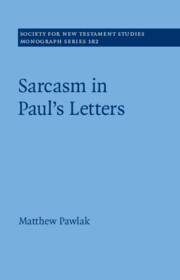
- Publisher:
- Cambridge University Press
- Online publication date:
- December 2022
- Print publication year:
- 2022
- Online ISBN:
- 9781009271929


In this book, Matthew Pawlak offers the first treatment of sarcasm in New Testament studies. He provides an extensive analysis of sarcastic passages across the undisputed letters of Paul, showing where Paul is sarcastic, and how his sarcasm affects our understanding of his rhetoric and relationships with the Early Christian congregations in Galatia, Rome, and Corinth. Pawlak's identification of sarcasm is supported by a dataset of 400 examples drawn from a broad range of ancient texts, including major case studies on Septuagint Job, the prophets, and Lucian of Samosata. These data enable the determination of the typical linguistic signals of sarcasm in ancient Greek, as well as its rhetorical functions. Pawlak also addresses several ongoing discussions in Pauline scholarship. His volume advances our understanding of the abrupt opening of Galatians, diatribe and Paul's hypothetical interlocutor in Romans, the 'Corinthian slogans' of First Corinthians, and the 'fool's speech' found within Second Corinthians 10-13.
‘Matthew Pawlak’s monograph is an important contribution to scholarship, and has implications not just for the study of Paul, but for literary analysis of any ancient text. In keeping with its subject matter, it is elegantly and engagingly written, and is brimming with exegetical insight and deft analysis of current scholarship. I can say without a trace of irony that this is a rare example of a scholarly book both fascinating and enjoyable to read!’
Simon Gathercole - Professor of New Testament and Early Christianity, University of Cambridge
‘Based on clearly defined terms and concepts, and employing a wide range of ancient examples, Pawlak clarifies the role of sarcastic language within Paul’s rhetoric, showing how and why the apostle uses sarcasm. This book sheds new light on Paul’s communicative strategies and language use.’
Jörg Frey - Professor of New Testament Studies, University of Zurich
‘In this groundbreaking work, Pawlak begins with a survey of ancient and modern discussions of irony in its various forms, and an examination of sarcasm in a wide range of Greek materials. Thus equipped, he identifies and treats sarcasm in Paul’s letters with a level of sophistication, precision, and nuance unmatched in earlier studies. Furthermore, his study of Paul’s use of sarcasm sheds light on other issues much debated within Pauline scholarship, including the use of diatribe in Romans and the historical background to 2 Corinthians 10–13. Altogether, a most impressive achievement.’
Stephen Westerholm - Professor Emeritus of Christianity, McMaster University
‘Matthew Pawlak offers a methodologically innovative and exceptionally precise examination of the use of irony and sarcasm across the Corpus Paulinum and its cultural and literary contexts. His impressive monograph represents a significant contribution to Pauline studies, in particular for shedding light on the apostle's complex argumentative strategies.’
Michael Tilly - Professor of Ancient Judaism and History of Hellenistic Religions, York St. John University
‘The rhetoric of sarcasm - one wonders why this has not yet been treated systematically in scholarship on Paul's letters. Matthew Pawlak does so here with all due thoroughness, bringing a new research topic into focus. His treatise on sarcasm in Greek literature - taking into account its structures and social contexts - not only offers new insights into Paul's communication, but is a sophisticated tool for further studies on the Septuagint and early Christian texts.’
Markus Öhler - Institute of New Testament Studies, University of Vienna
‘Matthew Pawlak's work, Sarcasm in Paul's Letters, fills a lacuna in Pauline scholarship. Recognizing sarcasm is vital for our interpretation of a text and Pawlak provides a working model for understanding this challenging, but essential, topic, and how it was signalled by ancient Greek authors. With detailed investigations of controversial passages, Pawlak provides new and fresh readings that challenge established arguments. This is an important contribution and warrants consideration by both biblical scholars and classicists.’
Sean Adams - Professor of New Testament and Ancient Culture, University of Glasgow
‘Pawlak’s monograph has many strengths, combining ancient evidence and modern theorizing about sarcasm, establishing a solid foundation on which to study the use of sarcasm in the letters of Paul, and his discussions of purported occasions of sarcasm in Paul are circumspect and insightful. Those interested either in Paul or ancient conventions around sarcasm will learn much from this book.’
Matthew Thiessen Source: Review of Biblical Literature
 Loading metrics...
Loading metrics...
* Views captured on Cambridge Core between #date#. This data will be updated every 24 hours.
Usage data cannot currently be displayed.